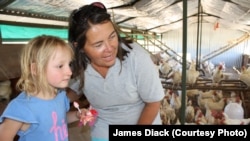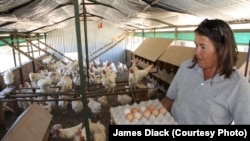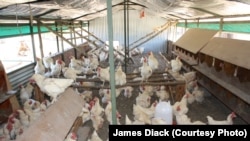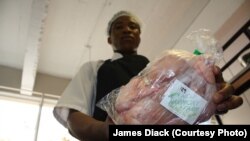Fresh spring water bubbles up from the ground and nourishes New Harmony Farm in the shadow of the Magaliesberg Mountains, north of Johannesburg.
Farmer Ruth Mylroie says when she bought the land almost six years ago it was "filthy with scrap metal," and overgrown with weeds.
"It took us six months to clean it," she recalls.
But now her farm is producing some of the best chicken in South Africa.
Mylroie, barefoot and her skin tanned a deep brown, is part of a new generation of farmers in the country. They're committed to producing high-quality food free of unnatural ingredients.
At the heart of the movement towards "natural" food is demand from consumers for healthy food that isn't manufactured with the help of chemicals and other artificial agents.
"I've just learned more and more as to what people shouldn't be doing. I know what I don't like, and I want to be ethically sound. I want my chickens to grow up as naturally as possible and to eat as natural a diet as possible," says Mylroie, as a pack of roosters struts and crows around her.
She looks proudly at them and says chickens have "fascinated" her since she was a child, especially their behavior and noise.
"Cluck, cluck, cluck all the time; they're talking to each other, there's an interaction going on all the time. It's the communicating of, I'm wanting to lay an egg, or the cackling when I've laid an egg. All of those to me are incredibly peaceful, natural sounds. I love them. I've always been a chicken lady. My nickname around town is ‘Chicken Lady,'" she says, laughing.
Doting on the chickens
Mylroie describes her chicken as "naturally grown," not as organic or free-range.
She says these terms are abused by many South African farmers and supermarkets because their use isn't policed by agricultural authorities.
"So you've got farmers caging their chickens at night and calling them free-range," she scoffs. "You've got retailers claiming fresh produce is organic when it's grown with pesticides."
Mylroie ensures her 600 chickens are clean and healthy.
When she enters their shed, they flock around her. When they're sick, the farmer doses them with medicine and sometimes even sleeps near them.
Inside her barns there's no pungent stink of chicken feces mixed with chemical cleaning agents.
The farmer says this is because she lines the floors with sunflower husk.
"It dries out the feces. There's no buildup of wet feces. The houses stay clean; they stay dry, free of flies," she said. "We put it into their food as well so it keeps them clean so we don't have a problem with worms, internal parasites…"
Chickens caged in their thousands on commercial farms are often surprisingly quiet. But New Harmony Farm chickens are very noisy. Mylroie ascribes this to their contentment.
"They're active, they're running around; they all pour out in the morning and run around catching insects, grubbing around the place," she says.
Natural diet for birds
Mylroie doesn't feed her birds artificial growth stimulants and fishmeal, as the big chicken operations usually do.
Crucially, says the farmer, her chickens eat natural food.
"Five different indigenous grasses that I'm planting; barley in the wintertime, spinach, rape, kale; all are extra feed for the chickens… that they get to eat, off the land," she said.
She says her chickens taste so good because of their diet and because they roam the land, so they're not fat. Also, their meat is denser because there's no water injected into it to increase the weight and sell for more money.
"The meat is a lot darker, so it's not pale, pale," says Mylroie. "It's the good old taste of chicken again. The youth of today, when they eat chicken, it's bland and tasteless. When they start to eat my chicken they say, ‘Oh, no; it tastes too much like chicken,' because they're not used to [natural] chicken."
‘It's not KFC…'
Nevertheless, Mylroie's chicken is much in demand in Johannesburg. She supplies delis and restaurants specializing in high-quality fresh produce.
One such place is The Service Station. Here, New Harmony chickens are always on the grill.
Manager Louw Kotze says he buys Mylroie's chickens because they're "simply the best."
"All the feedback we get is very positive. The cooking time on the chicken is a bit longer because it's [naturally grown]. But if you cook it for about an hour-and-a-half, hour-and-three-quarters, you get a very tasty, very tasty meal. Ruth's chicken is a top seller here," says Kotze.
He adds that his customers say New Harmony chicken has a strong, gamey flavor.
"I've heard someone say when they first tasted one of Ruth's chickens that for the first time in his life, he feels he is eating real chicken," Kotze says. "Put it this way: New Harmony chicken isn't KFC [Kentucky Fried Chicken]."
The high quality feed and treatment that Mylroie gives to her birds means she has to charge significantly more for her chickens, 57 rands (just over four dollars) a kilo, than the huge commercial operations, whose chicken retails as low as 27 rand (almost two dollars) a kilo.
No fear… Only of wild animals
Mylroie doesn't employ any laborers. The only help she gets is from her two young sons. The three live alone on the land, risky in South Africa where stock theft is rampant and criminals often murder farmers.
But Mylroie insists she doesn't feel threatened.
"I refuse to cage myself behind electric fences," she says. "My chickens aren't caged so why should we be? Our biggest enemy on this property is a honey badger, and wildcats. We have to lock all the birds up at night because of the wildlife, not because of the human factor."
She's convinced criminals don't target her farm because she maintains good relationships with local communities.
She laments that South Africa's government doesn't subsidize small food producers, like in many other countries. Every year many go bankrupt because of drought and other factors, and food is lost to the country.
"The last time we had an abattoir here that was close by, when that abattoir closed down, 19 small farmers shut down as a result of that, because they couldn't afford to go further away [to slaughter their animals]," Mylroie says. "In this country I don't think that we are encouraged as small farmers to survive. Who's there to back us up? If something goes wrong, I'm screwed."
But the farmer says she's determined to succeed, to "beat the odds," and to continue producing top-quality, natural chicken, without compromising her ethics.







